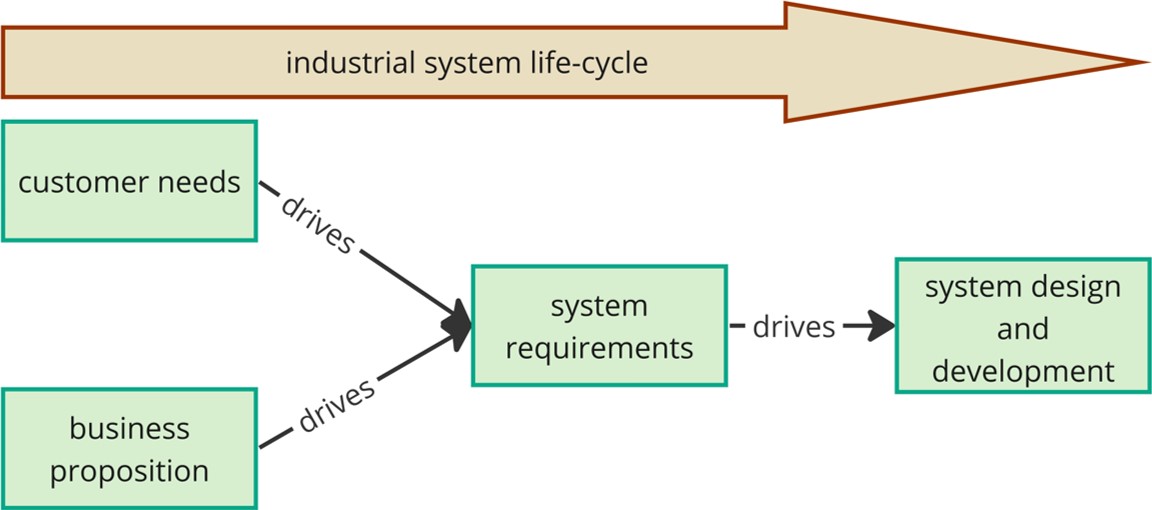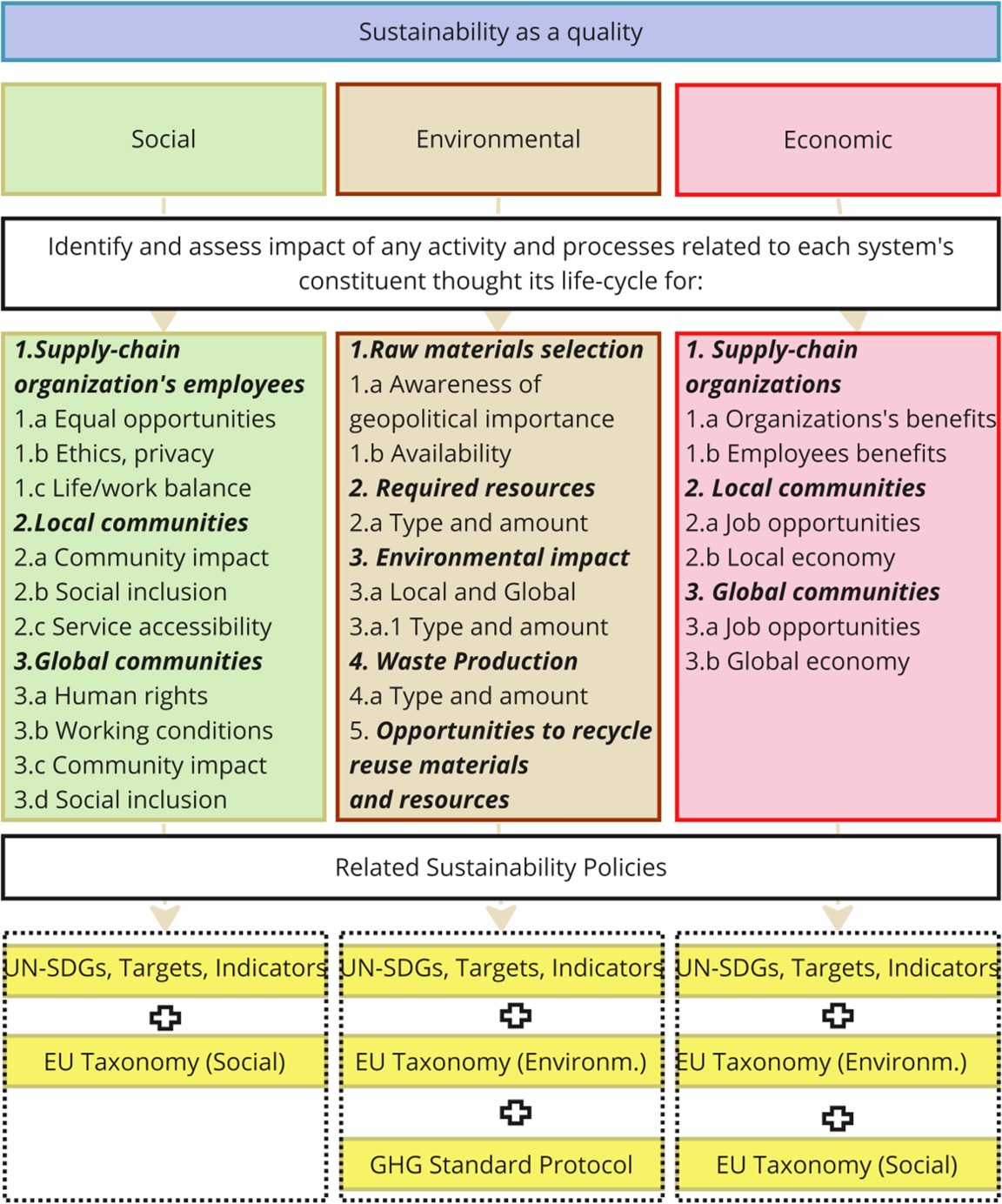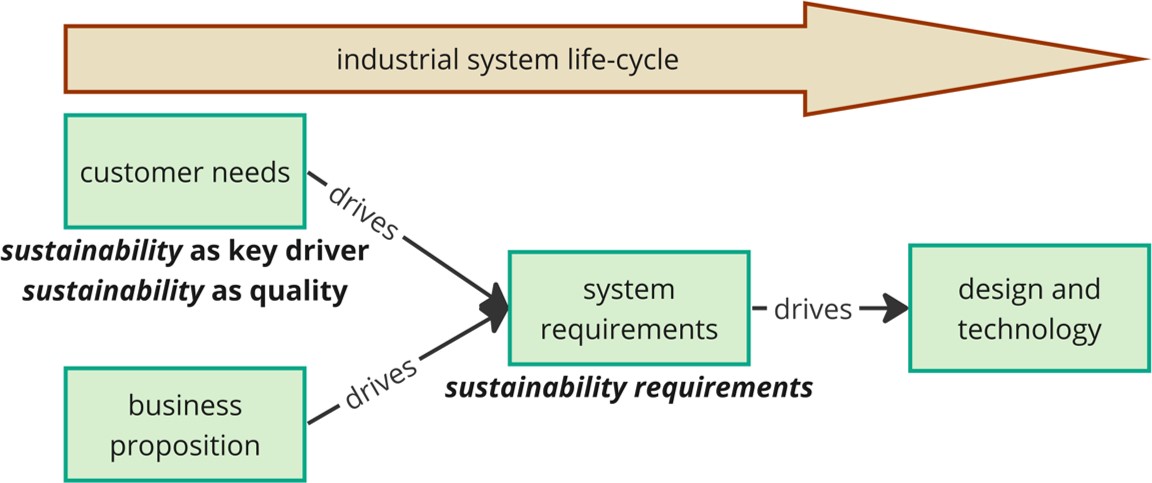Article Peer-Reviewed
A Systems Thinking Perspective on the Obstacles Faced by Industrial Organizations to Transition towards Sustainability
Department of Science and Industry Systems, University of South-Eastern Norway (USN), 3616 Kongsberg, Norway
*
For correspondence.
Academic Editor:
Received: 26 November 2023 Accepted: 16 April 2024 Published: 10 May 2024
Abstract
The climate crisis threatens the sustainable development of our planet. Mitigating the complexity of the sustainable challenge needs a holistic and systematic perspective. Systems solutions, such as systems thinking and systems engineering, can help to mitigate such challenges. Systems engineering in particular has to assist in transdisciplinary development and cooperation. Methods, tools, and methodologies in systems engineering can be key enablers to align the present world condition towards sustainable trajectories. To align with the sustainable transition, industrial organizations need to integrate sustainability at their core: the system’s development. Realizing socio-technical systems that are sustainable is not a triviality. Based on industry interviews and a literature study, this article discusses these challenges and presents how systems thinking and systems engineering disciplines may support industries to mitigate the same. To realize sustainable systems this work suggests i) identifying sustainability as a quality of the system; ii) collecting environmentally sustainable (big) data; and iii) establishing a collaborative environment among stakeholders where to discuss challenges related to the system’s lifecycle.
Figures in this Article
 Figure 1
Figure 1
 Figure 2
Figure 2
 Figure 3
Figure 3
 Figure 4
Figure 4
Keywords
Copyright © 2024
Giudici et al. This article is distributed under the terms of the Creative Commons Attribution License (CC BY 4.0), which permits unrestricted use and distribution provided that the original work is properly cited.
Funding
This study was funded by the Norwegian Research Council with grant number 317862.
Cite this Article
Giudici, H., Falk, K., Muller, G., Helle, D. E., & Drilen, E. (2024). A Systems Thinking Perspective on the Obstacles Faced by Industrial Organizations to Transition towards Sustainability. Highlights of Sustainability, 3(2), 240–254. https://doi.org/10.54175/hsustain3020014
References
1.
United Nations Framework Convention on Climate Change (UNFCCC). (2015). The Paris Agreement. https://unfccc.int/sites/default/files/english_paris_agreement.pdf (accessed 19 August 2023).
2.
United Nations. (2015). Transforming our world: the 2030 Agenda for Sustainable Development. https://sdgs.un.org/2030agenda (accessed 19 August 2023).
3.
European Environment Agency (EEA). (2019). The European Green Deal. Communication from the Commission to the European Parliament, the European Council, the Council, the European Economic and Social Committee and the Committee of the Regions (COM(2019) 640 final). https://www.eea.europa.eu/policy-documents/com-2019-640-final (accessed 19 August 2023).
4.
Markard, J., Raven, R., & Truffer, B. (2012). Sustainability transitions: An emerging field of research and its prospects. Research Policy, 41(6), 955–967. https://doi.org/10.1016/j.respol.2012.02.013
5.
TWI2050 – The World in 2050. (2018). Transformations to Achieve the Sustainable Development Goals. Report prepared by The World in 2050 initiative. International Institute for Applied Systems Analysis (IIASA). https://doi.org/10.22022/TNT/07-2018.15347
6.
European Commission. (2020). EU taxonomy for sustainable activities. https://ec.europa.eu/sustainable-finance-taxonomy (accessed 19 August 2023).
7.
World Resource Institute. (2023). The Green House Gas Protocol. https://www.wri.org/initiatives/greenhouse-gas-protocol (accessed 18 August 2023).
8.
Russell, S., Sotos, M. E., & Bostock, V. (2010). The Greenhouse Gas Protocol for the US Public Sector. World Resource Institute.
9.
European Environment Agency. (2019). The European Environment—State and Outlook 2020: Knowledge for Transition to a Sustainable Europe. https://www.eea.europa.eu/publications/soer-2020 (accessed 19 August 2023).
10.
Brundtland Commission. (1987). Our Common Future (Brundtland Report). Oxford University Press.
11.
Messerli, P., Murniningtyas, E., Eloundou-Enyegue, P., Foli, E. G., Furman, E., Glassman, A., et al. (2019). Global sustainable development report 2019: the future is now–science for achieving sustainable development. United Nations.
12.
Haskins, C., & Fet, A. M. (2023). Systems Engineering. In Business Transitions: A Path to Sustainability. Springer, Cham. https://doi.org/10.1007/978-3-031-22245-0_12
13.
Haskins, C. (2021). Systems engineering for sustainable development goals. Sustainability, 13(18), 10293. https://doi.org/10.3390/su131810293
14.
Fischer, J., Gardner, T. A., Bennett, E. M., Balvanera, P., Biggs, R., Carpenter, S., et al. (2015). Advancing sustainability through mainstreaming a social–ecological systems perspective. Current Opinion in Environmental Sustainability, 14, 144–149. https://doi.org/10.1016/j.cosust.2015.06.002
15.
Luthe, T., Fitzpatrick, H., Swat, J., Mühlethaler, T., & Crawford, A. (2–6 November 2021). Enriching Synergies in Systemic Design: Hybridizing science, design and transformative action. The Relating Systems Thinking and Design (RSD10) 2021 Symposium, Delft, The Netherlands.
16.
International Council of Systems Engineers (INCOSE). (2021). Systems Engineering Vision 2035, Engineering solutions for a better world. https://www.incose.org/publications/se-vision-2035 (accessed 19 August 2023).
17.
United Nations. (2022). The Sustainable Development Goals Report 2022. https://unstats.un.org/sdgs/report/2022/The-Sustainable-Development-Goals-Report-2022.pdf (accessed 19 August 2023).
18.
Stafford-Smith, M., Griggs, D., Gaffney, O., Ullah, F., Reyers, B., Kanie, N., et al. (2017) Integration: the key to implementing the Sustainable Development Goals. Sustainability Science, 12, 911–919. h https://doi.org/10.1007/s11625-016-0383-3
19.
Yang, L., & Cormican, K. (2021). The crossovers and connectivity between systems engineering and the sustainable development goals: a scoping study. Sustainability, 13(6), 3176. https://doi.org/10.3390/su13063176
20.
Loorbach, D., Rotmans, J., & Kemp, R. (2016). Complexity and transition management. In Complexity and planning (pp. 177–198). Routledge.
21.
Gaza, C. K. M. T., Giudici, H., & Falk, K. (in press). Enhancing Industrial Energy Management: Improving Efficiency and Stakeholder Satisfaction. In CSER 2024 Conference Proceedings. Springer Nature.
22.
Roustaei, S., Giudici, H., & Falk, K. (in press). Developing a KPI-driven framework to systematically align companies with the EU Taxonomy. In CSER 2024 Conference Proceedings. Springer Nature.
23.
Muller, G., & Giudici, H. (in press). Social Systems of Systems Thinking to Improve Decision-Making Processes Towards the Sustainable Transition. In CSER 2024 Conference Proceedings. Springer Nature.
24.
Hylleseth, T., Giudici, H., & Muller, G. (2024). Integrating IoT technology with a Systems Engineering Approach to Improve the GHG emissions accounting in the Waste Management Industry. The 34th Annual INCOSE Symposium 2024, Dublin, Ireland. [Accepted for presentation].
25.
Giudici, H., Bento, F., & Falk, K. (2024). How are industrial organizations adapting to the novel EU Taxonomy while developing sociotechnical systems? [Manuscript submitted for publication].
26.
Giudici, H., Strange, E., Falk, K., & Wettre, A. (2024). Adopting System Thinking and Systems Oriented Design approaches to make industrial organizations aware of novel insights related to the sustainable transition. NordDesign 2024, Reykjavík, Iceland. [Accepted for presentation].
27.
SEBoK. (2022). The Guide to the Systems Engineering Body of Knowledge (SEBoK) (version 2.7). https://sebokwiki.org/w/images/sebokwiki-farm!w/9/9d/Guide_to_the_Systems_Engineering_Body_of_Knowledge_v.2.7.pdf (accessed 4 May 2023).
28.
International Organization for Standardization (ISO). (2006). Environmental Management. Life Cycle Assessment. Principles and framework (ISO 14040:2006). https://www.iso.org/standard/37456.html (accessed 19 August 2023).
29.
International Organization for Standardization (ISO). (2008). Systems and software engineering. System life cycle processes (ISO/IEC 15288:2023). https://www.iso.org/standard/81702.html (accessed 19 August 2023).
30.
Purvis, B., Mao, Y., & Robinson, D. (2019). Three pillars of sustainability: in search of conceptual origins. Sustainability Science, 14, 681–695. https://doi.org/10.1007/s11625-018-0627-5
31.
Barbier, E. B. (1987). The Concept of Sustainable Economic Development. Environmental Conservation, 14(2), 101–110. https://doi.org/10.1017/S0376892900011449
32.
Sachs, J. D. (2012). From millennium development goals to sustainable development goals. The Lancet, 379(9832), 2206–2211. https://doi.org/10.1016/S0140-6736(12)60685-0
33.
Le Blanc, D. (2015). Towards integration at last? The sustainable development goals as a network of targets. Sustainable Development, 23(3), 176–187. https://doi.org/10.1002/sd.1582
34.
World Bank Group. (2019). Partnership Fund for the Sustainable Development Goals. Annual report 2019.
35.
United Nations Statistics Division. (2023). SDG Indicators, Metadata Repository. https://unstats.un.org/sdgs/metadata (accessed 4 May 2023).
36.
Elkington, J. (2013). Enter the triple bottom line. In The triple bottom line: Does it all add up? (pp. 1–16). Routledge.
37.
United Nations Conference on Trade and Development (UNCTAD). (2023). Circular Economy. https://unctad.org/topic/trade-and-environment/circular-economy (accessed 20 August 2023).
38.
Gibbons, L. V. (2020). Regenerative—The new sustainable? Sustainability, 12(13), 5483. https://doi.org/10.3390/su12135483
39.
Deamer, D. (2009). On the origin of systems: Systems biology, synthetic biology and the origin of life. EMBO Reports, 10(S1), S1–S4. https://doi.org/10.1038/embor.2009.117
40.
Bertalanffy, L. V. (1968). General system theory: Foundations, development, applications. George Braziller.
41.
Farlex. (2012). Systems Science. http://encyclopedia.thefreedictionary.com/systems+science (access 19 August 2023).
42.
Meadows, D. H. (2008). Thinking in Systems. Eartscan.
43.
Monat, J. P., & Gannon, T. F. (2015). What is systems thinking? A review of selected literature plus recommendations. American Journal of Systems Science, 4(1), 11–26. https://doi.org/10.5923/j.ajss.20150401.02
44.
Kim, D. H. (1999). Introduction to systems thinking (Vol. 16). Pegasus Communications.
45.
Salado, A., & Nilchiani, R. (2013). Contextual-and behavioral-centric stakeholder identification. Procedia Computer Science, 16, 908–917. https://doi.org/10.1016/j.procs.2013.01.095
46.
Checkland, P. B. (1989). Soft systems methodology. Human Systems Management, 8(4), 273–289. https://doi.org/10.3233/HSM-1989-8405
47.
Ho, K. K. J., & Sculli, D. (1994). Organizational theory and soft systems methodologies. Journal of Management Development, 13(7), 47–58. https://doi.org/10.1108/02621719410063413
48.
Bergvall-Kareborn, B., Mirijamdotter, A., & Basden, A. (2003). Reflections on catwoe, a soft systems methodology technique for systems design. Proceedings of the 9th Annual CPTS Working Conference, 18903, 18.
49.
Awuzie, B., Ngowi, A. B., Omotayo, T., Obi, L., & Akotia, J. (2021). Facilitating successful smart campus transitions: A systems thinking-SWOT analysis approach. Applied Sciences, 11(5), 2044. https://doi.org/10.3390/app11052044
50.
Gupta, A. (2013). Environment & PEST analysis: an approach to the external business environment. International Journal of Modern Social Sciences, 2(1), 34–43.
51.
Sevaldson, B. (2011). GIGA-Mapping: Visualisation for complexity and systems thinking in design. Nordes, 4.
52.
Wettre, A., Sevaldson, B., & Dudani, P. (13–15 October 2019). Bridging silos: A new workshop method for bridging silos. Relating Systems Thinking and Design (RSD8) 2019 Symposium, Chicago, USA.
53.
Sevaldson, B. (1–3 September 2015). Gigamaps: Their role as bridging artefacts and a new Sense Sharing Mode. Relating Systems Thinking and Design (RSD4) 2015 Symposium, Banff, Canada.
54.
Sillitto, H., Martin, J., McKinney, D., Griego, R., Dori, D., Krob, D., et al. (2019). Systems engineering and system definitions. INCOSE. https://www.incose.org/docs/default-source/default-document-library/final_-se-definition.pdf (accessed 18 August 2023).
55.
Muller, G. (2013). Systems engineering research methods. Procedia Computer Science, 16, 1092–1101. https://doi.org/10.1016/j.procs.2013.01.115
56.
Dixit, I., & Valerdi, R. (2012). Challenges in the Development of Systems Engineering as a Profession. INCOSE International Symposium, 17(1), 124–139. https://doi.org/10.1002/j.2334-5837.2007.tb02862.x
57.
Muller, G. J. (2004). CAFCR: A Multi-view Method for Embedded Systems Architecting; Balancing Genericity and Specificity [Doctoral dissertation, Delft University of Technology]. TU Delft Research Repository. http://resolver.tudelft.nl/uuid:a6a63694-d0c6-4102-a06e-11b9ea563a8d (accessed 19 August 2023).
58.
Muller, G. (2011). Systems Architecting: A Business perspective. CRC Press.
59.
Muller, G. (2023). What roles of politicians, managers, and systems engineering will be effective in sociotechnical systems? https://gaudisite.nl/info/SocioTechnicalSystemsRoles.info.html (accessed 20 August 2023).
60.
Penzenstadler, B., Raturi, A., Richardson, D., & Tomlinson, B. (2014). Safety, security, now sustainability: The nonfunctional requirement for the 21st century. IEEE Software, 31(3), 40–47. https://doi.org/10.1109/MS.2014.22
61.
Koçak, S. A., Alptekin, G. I., & Bener, A. B. (24 August 2015). Integrating Environmental Sustainability in Software Product Quality. Fourth International Workshop on Requirements Engineering for Sustainable Systems (RE4SuSy), Ottawa, Canada.
62.
Mahaux, M., Heymans, P., & Saval, G. (2011). Discovering sustainability requirements: an experience report. In International Working Conference on Requirements Engineering: Foundation for Software Quality (pp. 19–33). Springer Berlin Heidelberg.
63.
Bakshi, B. R., & Fiksel, J. (2003). The quest for sustainability: Challenges for process systems engineering. AICHE Journal, 49(6), 1350–1358. https://doi.org/10.1002/aic.690490602
64.
Matar, M., Osman, H., Georgy, M., Abou-Zeid, A., & El-Said, M. (2017). A systems engineering approach for realizing sustainability in infrastructure projects. HBRC Journal, 13(2), 190–201. https://doi.org/10.1016/j.hbrcj.2015.04.005
65.
Pearce, O. J., Murry, N. J., & Broyd, T. W. (2012). Halstar: systems engineering for sustainable development. Proceedings of the Institution of Civil Engineers-Engineering Sustainability, 165(2), 129–140. https://doi.org/10.1680/ensu.9.00064
66.
Cabot, J., Easterbrook, S., Horkoff, J., Lessard, L., Liaskos, S., & Mazón, J. N. (2009). Integrating sustainability in decision-making processes: A modelling strategy. In 2009 31st International Conference on Software Engineering-Companion Volume (pp. 207–210). IEEE. https://doi.org/10.1109/ICSE-COMPANION.2009.5070983
67.
Yin, R. K. (2018). Case Study Research and Applications - Design and Methods (6th ed.). SAGE Publications.
68.
Muller, G. (2011). Industry-as-laboratory applied in practice: The boderc project.
69.
Yin, R. K., & Davis, D. (2007). Adding new dimensions to case study evaluations: The case of evaluating comprehensive reforms. New Directions for Evaluation, 2007(113), 75–93. https://doi.org/10.1002/ev.216
70.
Friedenthal, S., Griego, R., & Sampson, M. (24–28 June 2007). INCOSE model based systems engineering (MBSE) initiative. INCOSE 2007 symposium, San Diego, CA, USA.
71.
Ramani, K., Ramanujan, D., Bernstein, W. Z., Zhao, F., Sutherland, J., Handwerker, C., et al. (2010). Integrated sustainable life cycle design: a review. Journal of Mechanical Design, 132(9), 091004. https://doi.org/10.1115/1.4002308
72.
Kjørstad, M., Falk, K., & Muller, G. (2020). Exploring a co-creative problem solving toolbox in the context of Norwegian high-tech industry. IEEE Systems Journal, 15(3), 4046–4056. https://doi.org/10.1109/JSYST.2020.3020155
73.
Engen, S., Falk, K., & Muller, G. (2021). Conceptual models to support reasoning in early phase concept evaluation-a Subsea case study. In 2021 16th International Conference of System of Systems Engineering (SoSE) (pp. 95–101). IEEE. https://doi.org/10.1109/SOSE52739.2021.9497467
74.
Schleicher, J., Schaafsma, M., & Vira, B. (2018). Will the Sustainable Development Goals address the links between poverty and the natural environment? Current Opinion in Environmental Sustainability, 34, 43–47. https://doi.org/10.1016/j.cosust.2018.09.004
75.
Carraro, F., Barbero, S., & Luthe, T. (2–6 November 2021). Mountain Water Management through Systemic Design: The Monviso Institute real-world laboratory. The Relating Systems Thinking and Design (RSD10) 2021 Symposium, Delft, The Netherlands.
76.
Barbier, E. B., & Burgess, J. C. (2017). The Sustainable Development Goals and the systems approach to sustainability. Economics, 11(1), 20170028. https://doi.org/10.5018/economics-ejournal.ja.2017-28
77.
Searcy, C. (2009). Corporate sustainability performance measurement: Lessons from system of systems engineering. In 2009 IEEE International Conference on Systems, Man and Cybernetics (pp. 1057–1060). IEEE. https://doi.org/10.1109/ICSMC.2009.5345999
Metrics
Loading...
Journal Menu
Journal Contact
Highlights of Sustainability
Editorial Office
Highlights of Science
Avenida Madrid, 189-195, 3-3
08014 Barcelona, Spain
08014 Barcelona, Spain
Cathy Wang
Managing Editor